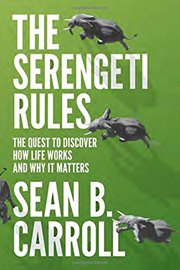The Serengeti Rules: The Quest to Discover How Life Works and Why It Matters
 Sean B Carroll
Sean B Carroll
Princeton University Press, £16.95
Over the past century, biologists have developed an understanding of the human body and the ability to intervene in processes at organ, cellular and sub-cellular levels. This has led to improvements in health and wellbeing, as well as the ability to cure and eradicate diseases.
Humans may think they have become far less dependent on the ecology of the Earth, but the substantial increase in the human population has now outstripped the Earth's ability to sustain its life-support systems and many important Earth resources are showing the strain.
To repair the damage, and for mankind to be able to enjoy a sustainable future, we must apply our understanding of the principles of ecological systems to the management of our environment.
In this very readable book, Sean Carroll illustrates this argument with reference to his understanding of molecular biology, and with accounts of research into specific ecological situations, including the Serengeti and Ngorogoro Crater in northern Tanzania. As a result of a visit to the Serengeti, and his wider biological knowledge, he has come up with a number of 'rules', which he suggests control an ecosystem in a steady state. What does not emerge is our understanding that these rules can lead to more than one steady state.
Carroll argues that the rules should be used to manage ecosystems for the benefit of mankind. He illustrates this claim with the restoration work in the Gorongosa National Park in Mozambique, which was almost destroyed by civil war in the late 20th century.
The book has diagrams and illustrations, a comprehensive set of notes on sources, a bibliography and an index. It would provide a valuable text as a basis for student and professional discussion.


